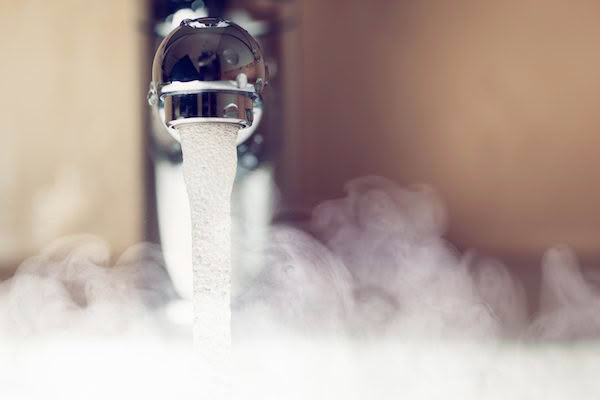This bad bug sounds the alarm about your water

E. coli is generally thought of as baddie in your water that makes you sick, but it’s actually doing you a favour.
Words: Nadene Hall
Escherichia coli or E.coli as it’s normally known won’t make you sick. Surprised? We’re all told it’s bad news to have E. coli in your water supply and while that is true, it’s unlikely this bacteria would be the reason you’ll get sick.
E. coli is a common gut bacteria that lives in humans and other warm-blooded animals, and is excreted by them. While it doesn’t usually cause illness on its own (there are some serious exceptions), its presence in drinking water is used to indicate that the water has been subjected to recent faecal contamination. What is really scary is that in 2002, 133,000 people were supplied with water containing unacceptable amounts of E. coli, and that number included 143 schools.
If your water has E. coli in it, it’s also possible it contains other nasties, like giardia, campylobacter and cryptosporidium.
If you have drinking water sourced from a well (shallow depth) or a bore (deep depth) or you capture rainwater from your roof, these are three nasties you need to protect yourself against. Use a first-flush diverter which automatically stops the first rainwater (often contaminated with faeces) from entering your storage tank. Keep the tank lid secure, and clean your tanks out.
You can also use specialist filter systems such as UV to keep your water clean, especially important if you have small children or anyone with a compromised immune system.
Test your water annually – there are specialist laboratories around NZ and a test is around $100.

Cryptospiridium
(pronounced crip-toe-spor-idium)
What is it: a parasite found in the gut of birds, fish, reptiles, humans and animals such as cattle, sheep, cats and dogs. It is passed on in the faeces of infected animals and humans. People get it through contaminated water and food or from contact with infected animals or humans.
Symptoms: diarrhoea (often watery), stomach cramps and abdominal pain, lack of appetite, weight loss.
What happens: symptoms appear between 2-14 days (usually seven) after becoming infected. It can last for two weeks or more and faeces may remain infectious for several weeks after the symptoms have gone. Some people may be infected but not develop any symptoms at all. The infection may be prolonged and life threatening to people with a weakened immune system.
Treatment: currently there is no effective treatment for cryptosporidiosis. However, your doctor may prescribe medication to help relieve symptoms.
How to avoid it: drinking water taken from the roof, rivers, lakes etc should be boiled for one minute or you should use an approved filter. When using roof water, spouting should be cleaned regularly and roofs kept clear of bird and animal droppings. Avoid placing TV aerials on the roof for birds to perch on and avoid planting trees close to the house to prevent animals from getting on to the roof.
Giardia
(pronounced gee-ah-dee-ah)
What is it: giardia is a parasite found in the gut of humans and animals such as cattle, sheep, cats, dogs, rats and possums. It is passed on in the faeces of infected animals and humans. Giardia is widespread in New Zealand and the parasites can live in the environment for long periods, especially in lake, river, stream and roof water.
Symptoms: foul-smelling diarrhoea, stomach cramps and abdominal pain, nausea and vomiting, weight loss, bloating, slight fever, headache, fatigue. Symptoms appear between 3-25 days (usually 7-10 days) after becoming infected. A person will usually be ill for 3-4 days and without treatment may remain infectious for months. During this time the person can spread the parasite to other people, even when there are no other symptoms.
Treatment: a doctor can prescribe a course of drugs.
How to avoid it: as for cryptosporidium.

Campylobacter
(pronounced cam-pile-oh-bacter)
What is it: an infection caused by bacteria which are found in the gut of birds especially poultry, and animals such as cattle, sheep, cats and dogs. It is passed on in the faeces of infected birds, animals and humans. People become infected when they swallow the bacteria in contaminated water and food, or from contact with infected animals or humans.
Symptoms: it usually begins with diarrhoea which may be blood-stained, stomach pain and cramps which may be severe, there may be influenza-like symptoms ie, headache, muscle pains, fever, fatigue. Symptoms may develop 1-10 days (usually 3-5 days) after contact with the bacteria and last for up to 10 days. However, a person can be infectious from the start of the illness for 2-7 weeks and relapses can occur.
Treatment: a doctor may give you a course of antibiotics if your case is severe, if you are older or if you have other health problems. However, campylobacter infection will usually get better without antibiotics if you follow your doctor’s instructions.
How to avoid it: as for cryptospiridium and giardia
 This article first appeared in NZ Lifestyle Block Magazine.
This article first appeared in NZ Lifestyle Block Magazine.
